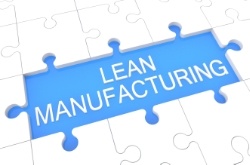Lean manufacturing has transformed many companies since its inception as the Toyota Production System many decades ago. It's enabled those firms who successfully implemented it to streamline and refine their operations to reduce waste at every level. In the process, they've benefited from enhanced quality, customer satisfaction, and productivity. But it wasn't all smooth sailing.

Any system that brings radical change to an organisation and its manufacturing methods is bound to have its downside. In some cases, these cons have led to the firm giving up and reverting to old ways. So how can decision makers decide whether 'lean' is for them, and if so, how can they best implement the process?
Ultimately, any firm can benefit from the application of lean principles providing the process is properly managed from the start and that the right systems are in place. Lean is complex and demands the kind of rigorous collection, analysis and dissemination of many key metrics that only effective enterprise resource planning (ERP) software can deliver.
Here's a look at the pros and cons of the lean business model along with some tactics you can adopt to ensure you end up with more pros than cons.
First, let's review what 'lean' actually means.
Lean Manufacturing 101
Lean production is a multifaceted process but at its heart, it strives to eliminate waste at all stages of the production. Waste refers to any process or activity that doesn't add value. Examples are excess production or inventory, defective products, and breakdowns in the flow of the manufacturing process.
Lean manufacturing has many components. One is in time (JIT) production in which the company matches production volume to orders. This offers the potential for reduced factory space, storage space, labour, and equipment, and thus improved productivity and profit margins. Other processes include Kaizen (continual improvement), total quality management, and Six Sigma.
Lean Manufacturing - The Upside
The most obvious benefit of using lean is the potential for considerable savings. Less equity is tied up in inventories of raw materials and finished products, which improves cash flow, for example.
In terms of fixed costs, savings can result from longer plant life and a reduced need for warehouse space. Variable cost savings can be gained through lower energy and labour requirements. Moreover producing to order results in more reliable delivery leading to increased customer satisfaction.
Lean Manufacturing - The Downside
One of the main cons of lean is the time it can take to produce results. The lean model is not just a system you tack onto your existing production setup. It's a major overhaul of your entire process and takes considerable time to plan, implement, and manage. At the same time regular production is affected leading to a drop off in volume which can seriously affect profitability.
Effective lean implementation also involves a thorough retraining of your staff so that they can adopt the necessary mindset and work methods. Time and effort is needed to gain support from involved parties at all levels from the boardroom to the factory floor.
The key way to minimise the impact of time is through thorough planning and having the right ERP system in place.
The Absolute Need for System and Strategy
Any complex and change-bringing process such as lean manufacturing is bound to throw up serious obstacles. However, adopting lean strategies is a smart move for any manufacturing company and never more vital for success than in these competitive times. But to be successful, it has to be a core component of the firm's overall strategy, and be guided by an ERP system that monitors and analyses every step. Only then do firms have a good chance of reaping the many benefits that 'lean' can deliver.



.png?width=120&height=120&name=MicrosoftTeams-image%20(4).png)


